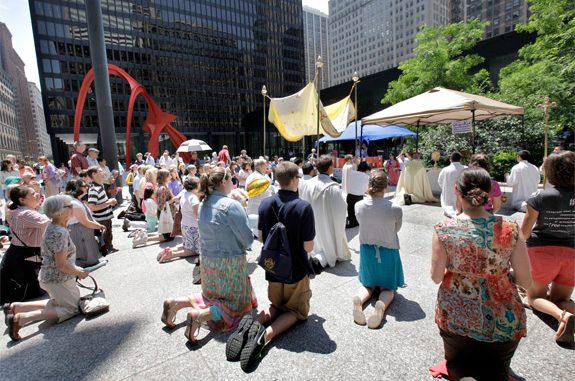
 An arbiter, derived from the Latin for judge, is defined as “one chosen to judge or decide a disputed issue”; also, “one who has the power to judge at will”.
An arbiter, derived from the Latin for judge, is defined as “one chosen to judge or decide a disputed issue”; also, “one who has the power to judge at will”.
Many insist that an arbiter for morality and behavior is irrelevant today, that enlightened societies have progressed beyond judging morality and behavior, unless behavior breaks a law. Nonetheless, it is evident that human beings, though many will not admit it, need an arbiter. The fundamental question is who or what will this arbiter be?
Belief systems are at the heart of this question. Scientific materialists deny a Deity and anything transcendent, including objective Truth. Many believe in a “disengaged Supreme Being, or force”, including Deists, New Agers, and Buddhists; Star Wars is a modern depiction of such a “force”. There are those who believe in an “engaged Supreme Being”, including many traditional Jews and Muslims. Most Christians believe in a “Trinitarian Supreme Being in solidarity with man, even as man.”
Pantheists and dualists accept numerous deities, some opposing others. Syncretists adopt bits and pieces of more than one of these belief systems. Agnostics profess to be ambivalent on the matter of a Supreme Being, with most eventually drifting into the camp of the scientific materialists or the syncretists.
Many scientific materialists who are critical of “Deity as arbiter” fail to acknowledge, or recognize, that they themselves have need of an arbiter. To those who assert that they are post-morality, offer a view contrary to the avant-garde positions on homosexual activity and reproductive “rights” and see what happens.
Consider. Whether one makes this choice explicitly or implicitly, all rely on an arbiter for essential questions of justice, truth and falsehood, good and evil. For those who believe in a Supreme Being, the Deity is this arbiter, with Truth revealed by the Deity’s corporate presence on Earth (in the sense of a cohesive association of believers) and revelatory texts. For the remainder, this arbiter is the state, the prevailing viewpoint of the milieu or of an avant-garde subculture, another human being, or themselves.
Traditionally, those who believe in an “engaged Supreme Being” have accepted this Being’s corporate Earthly presence and revelatory texts as revealing objective Truth, as being immutable. Today, many Jews, Christians, and Muslims who profess belief in an “engaged Supreme Being” have adopted, for all practical purposes, the attitudes of those who believe in a “disengaged force”; thus, revelatory texts are seen as constructs of man, perhaps noteworthy as works of art and wisdom, but not binding. Similarly, religious institutions are merely advisory, not having the authority to bind and loose. This belief system, aligned with that of the scientific materialists, is disposed to make the state, a fashionable viewpoint, another human being, or themselves the final arbiter of moral questions.
The state can be a capricious arbiter. Historical events, crises, and spellbinders often alter the state’s position on justice, human rights, and liberties. Even an enlightened constitution, if unlinked to anything immutable, can be re-interpreted or changed to fit the times and the demands of expediency. For those scientific materialists who declaim the tyranny of religion and the absurdity of objective Truth, one might pose this question: if there are no objectively valid moral norms, then why should I subject myself to “tyrannical” state laws – the preferred arbiter of many scientific materialists – if these laws conflict with my own desires? Why not insist that others obey these laws to promote an orderly society while doing what is in my own interests?
Likewise, the prevailing viewpoint or that of an avant-garde subculture. Like leaves in a meadow, these viewpoints remain “anchored” for a time, but are carried away by the stiff winds of this or that event, “anchoring” elsewhere until the next storm emerges.
Human beings are notoriously fallible. Making even the wisest among us an arbiter of moral questions is risky business, not to mention investing authority in a Hitler or Stalin.
Many of us make ourselves the arbiter of everything, though we may not admit it to others, or even ourselves. This purely subjective attitude leads to a cacophony of viewpoints, none more valid than any other, resulting in moral confusion and metaphysical myopia.
Wouldn’t a rational and disinterested observer conclude that an arbiter affirmed by wise and courageous people across the centuries, countercultural in every age, battered by external and internal tribulation, inured to the present whims and fashions, and tested by the experience of millennia, is more credible than transient states, viewpoints anchored to a particular milieu, or fragile human beings? Despite unfaithful and predatory people in the Church, it was this Church that first bestowed human dignity on women, slaves, the poor and dispossessed, lepers, and foreigners, a forerunner to the universal rights of man and constitutional government.
Contrary to what scientific materialists would have us believe, it isn’t a matter of pitting an anachronistic arbiter of people of faith against enlightened liberty. The question is: who or what is the arbiter of morality and behavior? The choice is between an arbiter who understands man’s nature and offers a demanding path to genuine happiness and freedom, and fickle states, fashions, and human beings that can’t deliver what they promise. So it has always been.
If you value the news and views Catholic World Report provides, please consider donating to support our efforts. Your contribution will help us continue to make CWR available to all readers worldwide for free, without a subscription. Thank you for your generosity!
Click here for more information on donating to CWR. Click here to sign up for our newsletter.


